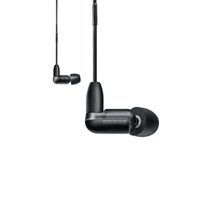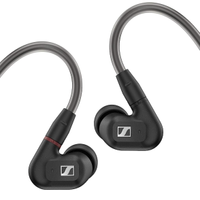If you’re in the market for premium wired in-ear headphones, it’s not going to get a whole lot better than the Sennheiser IE 600. These earphones bring fine sonic details to the surface, while delivering clear, balanced overall sound quality – they don’t come cheap, but that’s okay when they sound this good.
Pros
- +
Stunning sound quality
- +
Great durability
- +
Quick and easy to find comfortable fit
Cons
- –
Come at a steep price
- –
No in-line mic or volume controls
- –
Cable a little flat design-wise
Why you can trust TechRadar We spend hours testing every product or service we review, so you can be sure you’re buying the best. Find out more about how we test.
Sennheiser IE 600 review
The Sennheiser IE 600 are a pair of in-ear monitors that paint the most delicate details onto a canvas. They excel in tying several sonic elements together into a beautiful work of art, with exceptionally clear and beautifully balanced audio, plus strong separation, too. Of course, such qualities come at a steep price (around $800 / £700 / AU$1,200), but there’s no denying that the Sennheiser IE 600 offer excellent quality on a number of levels.
First of all, the Sennheiser IE 600 are particularly skilled in supplying defined audio – in part because of their dual two-chamber absorbers. These essentially capture and attenuate multiple sounds occupying the same frequency range, according to Sennheiser, meaning that you can enjoy textured audio and pick out the finer details. As a result, it never feels like you have to go on a mission to discover intricate audio attributes – the Sennheiser IE 600 does all the necessary heavy lifting to ensure that each unique sonic element is unearthed.
The IE 600 perform fantastically across all frequencies – perhaps unsurprising given that they’re the higher-priced sibling of the Sennheiser IE 300, which proudly sit on our list of the best wired headphones. When listening to Rains again by Solji, the rain coming down throughout the introduction is utteraly natural and convincing, with each drop defined. In addition to that, the earphones perfectly captured the delicate nature of the track’s high-pitched vocals and finer details, such as the click of the singer’s tongue on the palate. Vocals in the mid-range also pop really well on the IE 600, and often sound slightly forward, but never in a way that disrupts overall balance.
Sennheiser claims that the IE 600 deliver “fast, accurate bass”, and it isn’t wrong. When tuning into Black Eye by Allie X, I was wowed by the rapid pumping of the drum machine as the bassline dipped to impressive depths; it bounced up in a very controlled manner. The depth of the bass was certainly imposing, so if you’re the kind of person who wants to experience meaty low-frequency sounds, these IEMs won’t disappoint.
The authoritative nature of the bass ties into a wider theme with the IE 600; they excel in serving up powerful, full-bodied audio. When switching between the far cheaper, but still fantastic, Sennheiser IE 200 and the IE 600, I certainly felt that the latter offered a more all-encompassing listening experience, mainly due to their ability to show off subtle sonic details. For instance, I used the IE 600 to test out I Want You by Moloko and felt genuinely energized by the almost cinematic reproduction of the tune. The IE 600 faithfully captured the track’s complexity, including the intro’s breathy vocals, natural-sounding keys, and the several instruments that enter the fray later in the track to form a dense, layered mix.
Of course, you understand why they’re so difference when you compare the IE 200’s price of $149.95 / £129.99 / AU$239.95 to the IE 600 at 4-5 times that. No wonder the IE 600 are a cut above for sound, and will impress hardcore audiophiles.
Now that’s out of the way, let’s talk design. The IE 600 are beautifully manufactured, and their 3D-printed metal casing rocks a textured, classy look. Fun fact: the metal used to build the IE 600 – ZR01 amorphous zirconium – is the same type used for the drilling head of NASA’s Mars Rover. Now, that’s pretty sturdy. The earphones are still small and relatively lightweight, though. Coming in at 0.21oz / 6g (per bud), they bring elegance alongside durability. They also fit really well, and it took me no time at all to find the right feel. The earphones are attached to a bendy cable, which makes it easy to adjust the fit around your ear and achieve maximum comfort. Speaking of which, I never felt any irritation while wearing the IE 600, even when keeping them in for full work days. Thankfully, I was subjected to very limited cable noise, something that can be a real mood-killer with a lot of wired in-ear headphones.
My personal feeling is that the IE 600’s gray cable is a bit of a downgrade on the plaited silver one included with the IE 200. Although the IE 600’s wire has a smooth, clean aesthetic, I found myself more attached to the feeling and chain-like appearance of the cheaper model. Like the IE 200, it’s a shame that the included cable here doesn’t include an in-line controller or mic, which makes the IE 600 a little inconvenient if you’re on the go and have to adjust volume via the source device. There’s a way around this – but it involves spending an additional £59.99 (about $75 / AU$115) on an alternative Sennheiser cable with built-in controller.
The default wire for the IE 600 has a 3.5mm connector, but the box also includes one with a 4.4mm connector that you can attach the earphones to instead. There are other extras bundled in too, including a hard carry case, a cleaning tool, a clip that you can attach to the IE 600’s cable, and a collection of different-sized foam and gel ear tips. I found that the foam tips were the most comfortable, and they assist in enabling pretty solid noise isolation. If you want near-silence, though, you’ll get a greater effect from the best noise cancelling earbuds.
Overall, the Sennheiser IE 600 are a brilliant pair of IEMs that I thoroughly enjoyed using. If you’re looking to invest in some top-quality wired in-ear headphones, these will almost certainly sound the part – and last you for many years to come. As a result, I can definitely recommend the Sennheiser IE 600 – especially because you shouldn’t need to pay list price (which is a touch high in my opinion), but should be able to pay more like $500 / £500 / AU$1,000.

Sennheiser IE 600 review: Price and release date
- $799 / £699 / AU$1,199
- Launched in March 2022
There’s no denying it, the Sennheiser IE 600 are pretty expensive. With a list price of $799 / £699 / AU$1,199, they’re truly in the high-end category compared to the likes of the Sennheiser IE 200 – although they’re capable of fuller, more detailed sound. On the flip side, the IE 600 are considerably cheaper than their even more premium sibling, the Sennheiser IE 900, which have a list price of $1,499 / £1,299 / AU$2,399.
A crucial factor here is that it’s pretty unlikely you’ll have to fork out the list price to get your hands on the Sennheiser IE 600. I spotted them for as little as $469.95, £499.99, and AU$972 (in the latter’s case via Sennheiser’s own online store), so be a savvy shopper.
Sennheiser IE 600 review: Specs
Swipe to scroll horizontally
| Drivers | 7mm dynamic |
| Weight | 0.21 oz / 6g (per bud) |
| Frequency range | 4Hz-46.5kHz |
| Waterproof rating | Not stated |
| Other features | Detachable cable, additional ear tips, carry case, cleaning tool, additional cable |

Should you buy the Sennheiser IE 600?
Swipe to scroll horizontally
| Attributes | Notes | Rating |
|---|---|---|
| Features | Solid noise isolation, D2CA works excellently, but an in-line mic would be nice. | 4/5 |
| Sound quality | Stunning all-round sound, from the natural separation of instruments to the deep, engrossing bass. | 5/5 |
| Design | Comfortable, durable, and premium-looking earphones. | 4.5/5 |
| Value | Expensive at list price, but at the sale price we regularly see them, they’re phenomenal bang for buck. | 4/5 |
Buy them if…
You’re an audiophile
The Sennheiser IE 600 will please a lot of audiophiles out there. Ultra-low distortion and strong separation mean that these IEMs will likely impress even the most attentive listeners. For peak performance, the Sennheiser IE 900 may still be better.
You want to invest in a long-term pair of IEMs
The IE 600 are made from the super-durable ZR01 amorphous zirconium, and are designed to resist both corrosion and scratching. As a result, you can bet that these will last you for quite some time.



